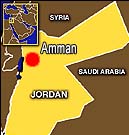German Archaeological Institute unveils Jordanian artefacts
 Amman - The German Protestant Archaeological Institute on Wednesday displayed artefacts dating back to the bronze and Umayyad periods, 3500 B. C. and 1800 A. D., which were discovered by German archaeologists over the past five years.
Amman - The German Protestant Archaeological Institute on Wednesday displayed artefacts dating back to the bronze and Umayyad periods, 3500 B. C. and 1800 A. D., which were discovered by German archaeologists over the past five years.
The treasures were found in one of the most productive archaeological excavations in Jordan, the so-called Tall Zira'a in the Waid al-Arab area in northwest Jordan.
"There is hardly an area in northwest Jordan that is more fascinating for archaeologists than the Wadi al-Arab which is part of an important ancient trade route," the Institute's chief, Jutta Haser said at the ceremony that was attended by the German ambassador Joachim Heidorn and senior Jordanian officials.
"After six campaigns that started in 2003, it can be stated that the results exceeded all expectations since a sequence from the Umayyad period to the late Bronze Age period with city walls, residential areas and rural installations were brought to light," she added.
She pointed out that the findings included cylinder seals, terracotta figurines, bronze tools as well as thousands of pottery pieces that "shed light on the local and regional history and give insight into the exchange if ideas and material in a contact zone between different cultures".
Haser said that the finds had to be brought to Germany, where two conservators worked on the material. The artefacts will now be displayed at Jordanian museums, she added.
The restoration has been financed by the German Foreign Ministry and private donors to the Biblical Archaeological Institute in Wuppertal, the German embassy said in a statement. (dpa)